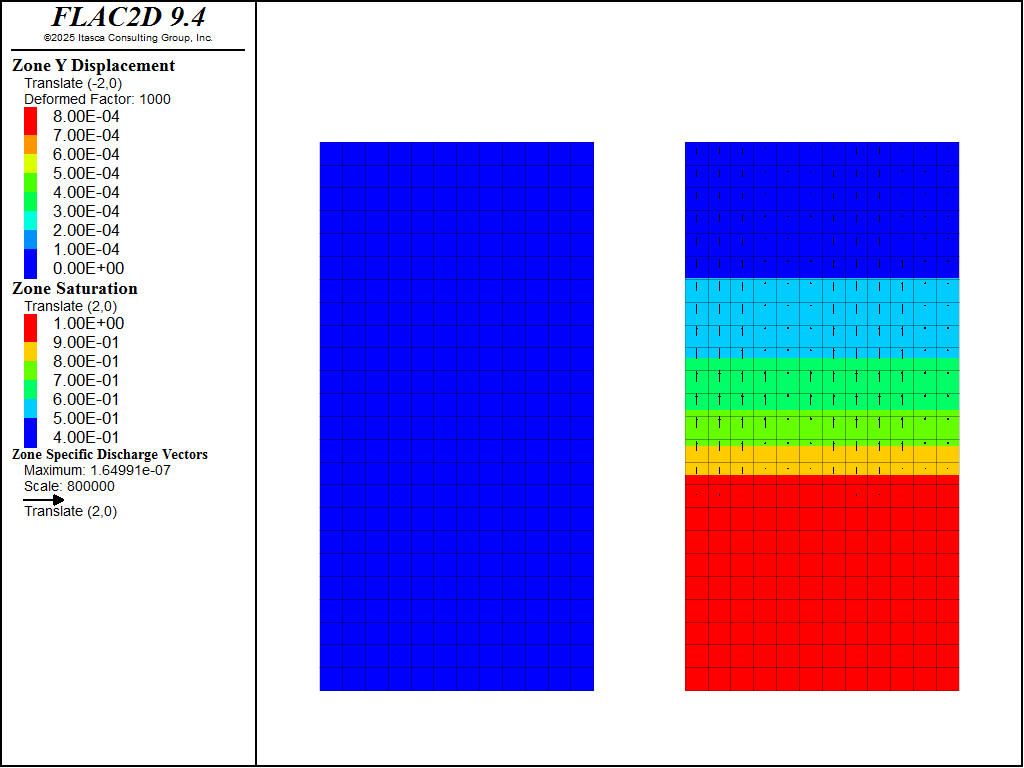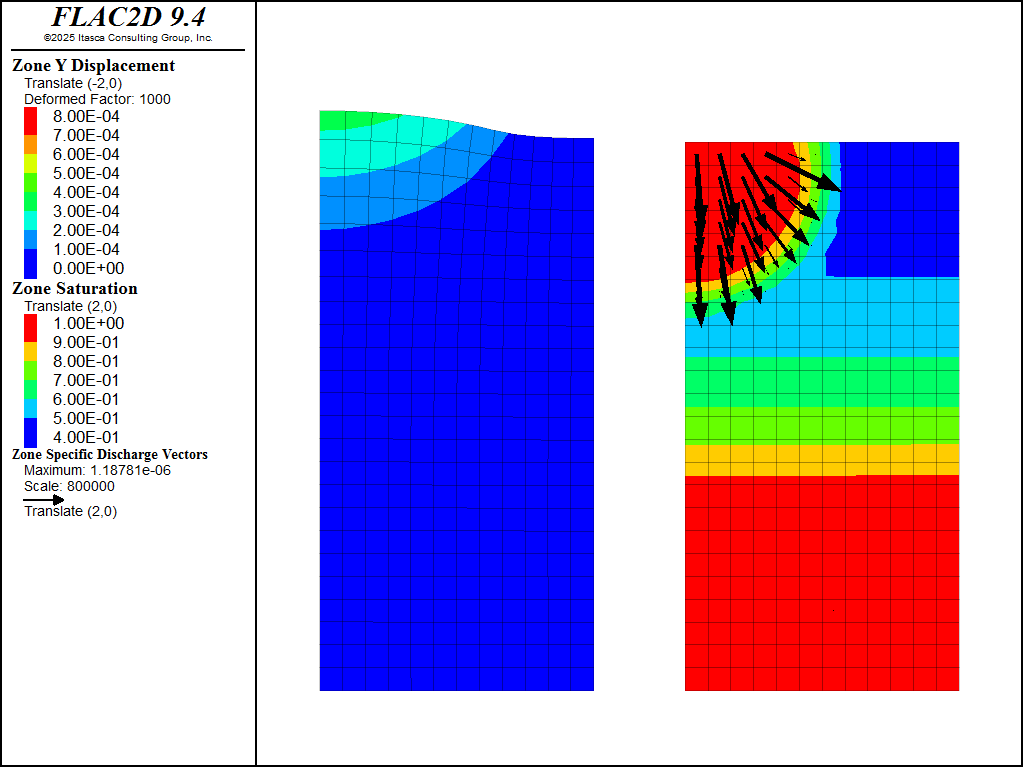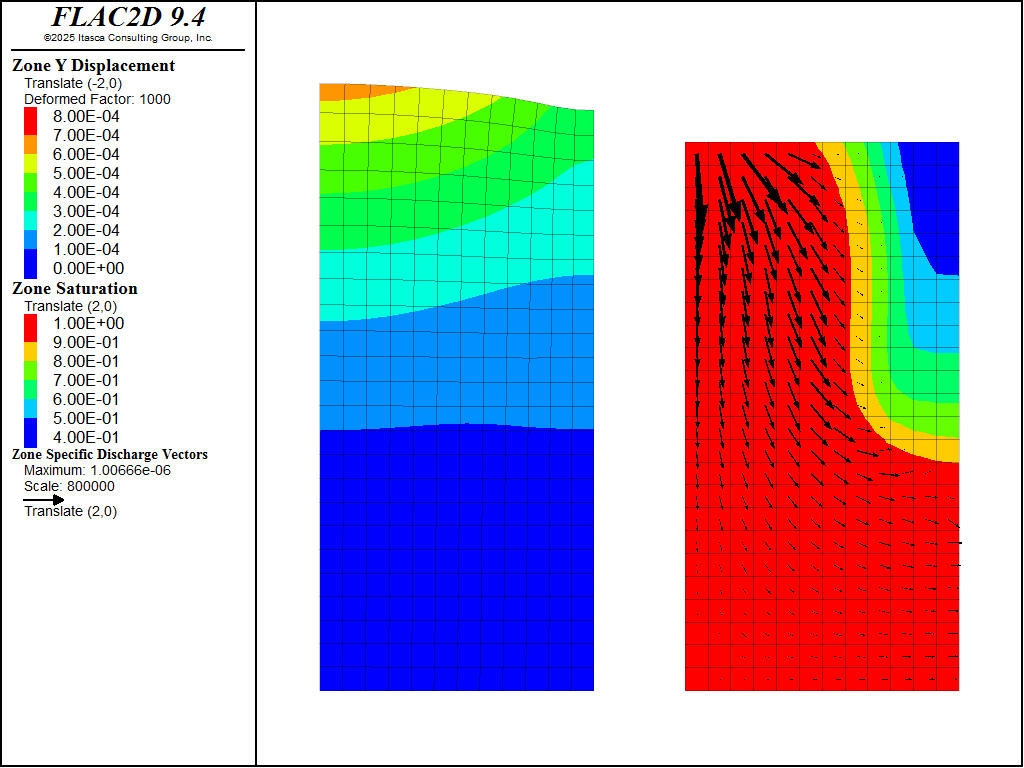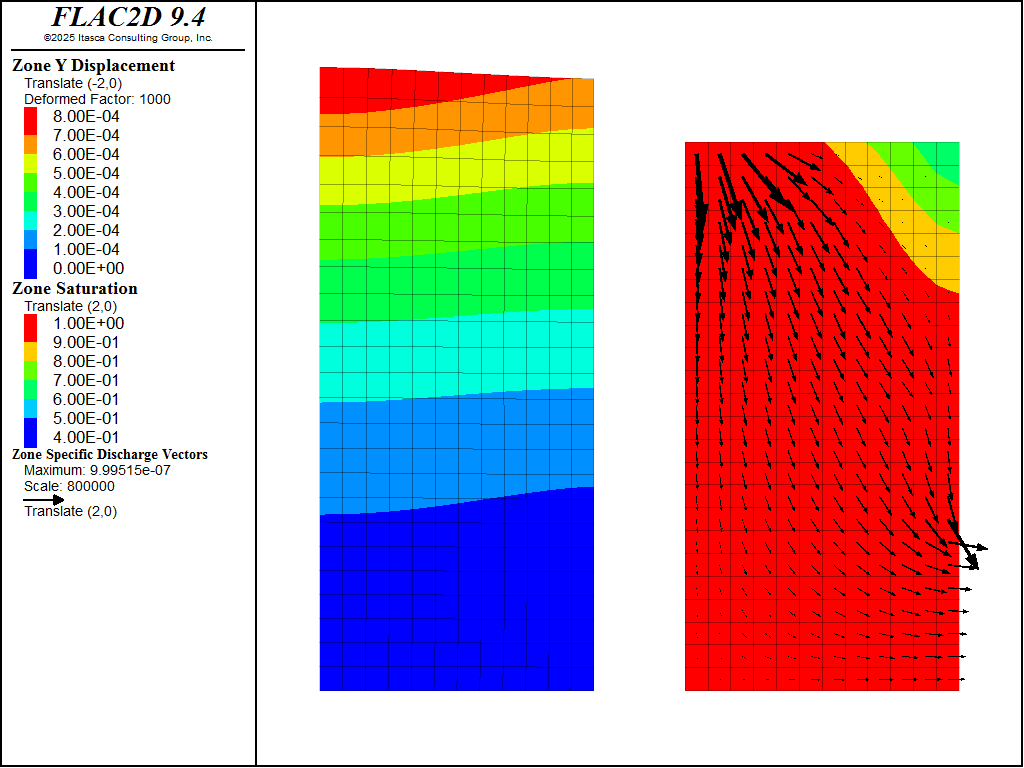Deformation Caused by Filling of a Caisson (FLAC2D)
Problem Statement
Note
This project reproduces Example 2.5.5 from FLAC 8.1. The project file for this example is available to be viewed/run in FLAC2D.[1]. The project’s main data files are shown at the end of this example.
This academic example studies the mechanical deformation caused by infiltration of water in a caisson filled with a porous material. The caisson is 6 m in width and 6 m in height. Initially, the bottom 2 m of the caisson is fully water saturated and steady-state conditions prevail. The top of the caisson is then exposed to a constant flux of water (flow rate of \(q=0.2\) m/day) on a span of 1 m located at the center. During the experiment, the water level is kept at the initial height on the later sides. The evolution of saturation and soil deformation is monitored for a total of 20 days. The fluid and rock properties are given in Table 1 and 2, respectively.
Property |
Value |
|---|---|
Porosity |
0.3 |
Sat. mobility coefficient |
1 \(\times\) 10-10 m2/Pa s |
Wetting-phase compressibility |
0.001 kPa-1 |
Residual saturation |
0.0 |
van Genuchten \(m\) |
0.336 |
van Genuchten \(n\) |
1.506 |
van Genuchten \(p_{ref}\) |
7 kPa |
Rel. permeability exponent \(b\) |
0.5 |
Property |
Value |
|---|---|
Constitutive model |
elastic |
Solid density |
1500 kg/m3 |
Bulk modulus |
100 kPa |
Shear modulus |
30 kPa |
By symmetry, half of the caisson is considered in the numerical model. The left vertical boundary is the symmetry line. The modeling domain is discretized by 12 zones in the horizontal direction and 24 zones in the vertical direction. The mechanical boundary conditions correspond to zero normal displacement at the lateral and bottom sides of the caisson. Lateral displacements are also restricted at the bottom of the model, i.e., fixed in both directions. Moreover, the relative permeability of the wetting-phase is given by:
where \(k_{rw}\) is the relative permeability of the wetting-phase, \(S_{w}\) is the water saturation, \(b\) is the relative permeability exponent, and \(m\) is a van Genuchten fitting parameter.
Changes in wetting-phase pressure \(p_w\) are governed by the following equation, assuming isothermal conditions:
where \(M\) is the saturated Biot modulus, \(\zeta\) is the variation of fluid content, \(\phi\) is the porosity, \(\epsilon\) is the volumetric strain, and \(p_c=-p_w\) is the capillary pressure, or suction. The term on the left hand side of equation (3) and in brackets is the inverse of the Biot modulus in partially saturated conditions.
Initial pore pressure and saturation are are assigned using a FISH function. The distributions correspond to the steady state conditions with water level 2 m above the bottom of the caisson (\(y=2\) m). The initial stresses—in equilibrium under gravity and consistent with the initial saturation distribution—are calculated numerically during gravity initialization. The initial horizontal-to-vertical effective stress ratio is 1. The numerical model is carried out for a total of 20.8 days, with intermediate results at four additional times.
Results
Figures 1 to 4 show the saturation contours, fluid flow vectors, and deformations taking place during the filling process.

Figure 1: Deformation and saturation contours at time \(t=0\) days.

Figure 2: Deformation and saturation contours at time \(t=2.3\) days.

Figure 3: Deformation and saturation contours at time \(t=6.9\) days.

Figure 4: Deformation and saturation contours at time \(t=20.8\) days.
Data Files
filling_of_caisson.dat
model large-strain off
model configure fluid-flow
model gravity 0 -10
[Cw = 1e-6] ; Wetting phase compressibility [1/Pa]
[Cnw = 1e-3] ; Non-wetting phase compressibility [1/Pa]
[n = 1.506] ; Van-Genuchten n
[m = 0.336] ; Van-Genuchten m
[pr = 7e3] ; Van-Genuchten pref [Pa]
[b = 0.5] ; Relative permeability exponent
[h = 2.0] ; Inital saturated height [m]
[q = 0.2 / 86400.0] ; Wetting phase injection rate [m/s]
program call "functions"
zone create quadrilateral size 12 24 ...
point 0 (0, 0) point 1 (3, 0) ...
point 2 (0,6)
zone face apply velocity-normal 0 range position-y 6 not
zone face apply velocity-x 0 range position-y 0
zone fluid property fluid-density 1000 porosity 0.3 ...
mobility-coefficient 1e-10 fluid-modulus [1/Cw]
zone fluid unsaturated van-genuchten [n] [m] [pr]
[init_pp]
[rel_perm]
[save(0)]
zone cmodel assign elastic
zone property density 1500 bulk 1e8 shear 0.3e8
zone initialize-stresses total ratio 1.0
model solve-static
zone fluid property pore-pressure-generation on
zone fluid property effective-cutoff -1e20
zone fluid permeability-saturation table "krw"
zone face apply discharge [q] range position-x 0 0.75 position-y 6
model solve-fluid-coupled time-total 2e5 convergence 2
[save(1)]
model solve-fluid-coupled time-total 6e5 convergence 2
[save(2)]
model solve-fluid-coupled time-total 18e5 convergence 2
[save(3)]
functions.dat
;------------------------------------------------------;
; Functions: Deformation Caused by Filling of a Caisson.
;------------------------------------------------------;
fish define init_pp
; Initialize pore pressure
local g = math.abs(global.gravity->y)
local gw = zone.fluid.density(::zone.list)(1) * g
; Above phreatic surface (partially saturated)
local pos = gp.pos(::gp.list)
local gps = gp.list(pos->y > h)
local posa = gp.pos(::gps)
local pi = (h - posa->y) * gw
local pc = -pi
local Swi = 1.0 / (1.0 + (pc/pr)^n)^m
gp.pp(::gps) ::= pi
gp.sat(::gps) ::= Swi
; Below phreatic surface (fully saturated)
gps = gp.list(pos->y <= h)
local posb = gp.pos(::gps)
gp.sat(::gps) = 1.0
gp.pp(::gps) ::= (h - posb->y) * gw
; Boundary condition
gps = gp.list((pos->y <= h) and (pos->x == 3.0))
local posbc = gp.pos(::gps)
gp.pp.fix(::gps) ::= (h - posbc->y) * gw
end
fish define rel_perm
; Wetting phase relative permeability
local tab = table.create("krw")
loop for(local i = 0.01, i <= 1.0, i += 0.01)
krw = i^(b)*(1.0 - (1.0 - i^(1/m))^m)^2
table(tab, i) = krw
endloop
end
⇐ Capillary Infiltration in a Dry Caisson (FLAC2D) | Embankment Consolidation (Mohr-Coulomb) (FLAC2D) ⇒
| Was this helpful? ... | Itasca Software © 2024, Itasca | Updated: Jun 07, 2025 |
